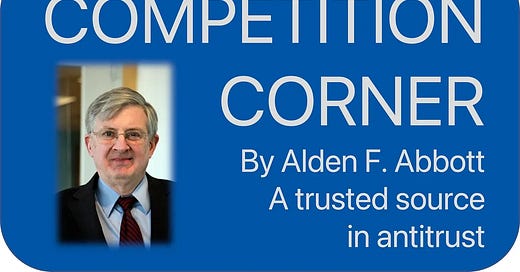Greetings, competition fans!
Starting with the next issue, the Competition Corner will be growing, featuring presentations from other Mercatus scholars. Visiting research fellow Satya Marar and Program Director Giorgio Castiglia of the Mercatus Center competition team will become regular contributors. In addition, Mercatus experts such as senior research fellow Christine McDaniel, a distinguished international trade expert, will submit articles as the occasion warrants.
We’ll also be issuing updates more frequently than in the past. Our subscribers need do nothing – you will receive an email linked to new material as it is released, to reflect breaking developments and hot topics.
We hope that you will enjoy the new expanded Competition Corner!
Now, onto the team’s work for this month.
The Courts Strike Back: Chevron Deference’s End & More
Law nerds on the classically liberal side will be pleased by three recent Supreme Court decisions limiting the power of the executive state. I analyze the implications of Loper Bright v. Raimondo, SEC v. Jarkesy and Corner Post Inc. v. Board of Governors of the Federal Reserve System in my column for Forbes.
Loper Bright in particular has provoked spirited debate and discussion for overruling the controversial Chevron doctrine, which allowed courts to defer to an agency’s own interpretation of the laws that it enforces for resolving any ambiguities, so long as their construction was ‘reasonable’. Though some have hailed the end of Chevron deference as a game changer in deterring executive overreach, Satya Marar argues that little will actually change. Check out his op-ed in The Hill. (In a July 25 Federalist Society “Supreme Court roundup” speech, former Solicitor General Paul Clement opined that Loper Bright will have major policy significance.)
Although these Supreme Court victories are welcome, there is still much to be done at the legislative and executive level. Regulatory reforms that reduce the burdens unduly placed on citizens and businesses will benefit all Americans. Conversely, overregulation harms competition and adds to the nation’s economic ills, as I argue in my piece for Forbes, published on July 24.
In the AI world, the threats to competition and future technological innovation from overzealous regulation and ill-advised antitrust enforcement decisions are particularly concerning, as I note in my other Forbes piece, published on 26 July. To better understand how antitrust law applies to artificial intelligence issues, and how policymakers, regulators and enforcers should approach it, check out Satya Marar’s primer on AI and antitrust.
Return of the Fed-i: How Americans & Their Federal Government Subsidize The World’s Medicine
Most Americans don’t realize that quirks in the way that U.S. Medicare and Medicaid purchase drugs mean that American taxpayers and patients pay more than their counterparts abroad. In places like Australia, the UK, Canada and most of Europe, public insurers negotiate drug prices with pharma companies- something that U.S. Medicare and Medicaid aren’t allowed to do. Although this contributes to higher drug prices at home, it has also helped fund countless cutting-edge medical innovations that the world benefits from, and has made the U.S. pharma industry a global leader. Satya Marar and Reason Foundation policy analyst and Case Western Reserve school of medicine PhD student Jacob Rich discuss how the system works, and the tradeoffs of various alternative proposals in their piece for Discourse Magazine.
The Anti-competitive Menace?: DOJ v. Google Decision Expected Soon
The government has charged Google with unlawfully exercising monopoly power over internet search, in violation of the Sherman Act, and a decision in this case is expected to be handed down within the next few months. Merely possessing monopoly power is not unlawful. The question is whether Google improperly maintained monopoly power. In his working paper titled “Harm to the Competitive Process in the Google Case,” Gregory J. Werden argues that the company did not breach antitrust law by harming the competitive process. Instead, Google “competed on the merits” and is entitled to the rewards of its success.
That’s all for now. See you next month.





